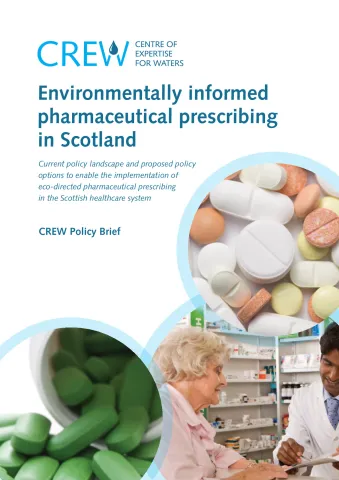The prescription of pharmaceuticals is the most commonly used healthcare intervention and indisputably has an important role to play in human health. However, pharmaceuticals can have negative effects on the environment and living organisms. Firstly, pharmaceutical use significantly contributes to the healthcare sector’s carbon emissions. Secondly, pharmaceutical residues from human excretions and improper disposal of unused medicines can enter the water environment through wastewater and endanger aquatic life. Thirdly, pharmaceutical substances in the environment are thought to contribute to the global threat of antimicrobial resistance.
Often, a choice of pharmaceutical options is available to prescribers with decisions informed by therapeutic benefit, cost, and patient-related factors. To account for the environmental impacts of pharmaceuticals, environmentally informed or eco-directed prescribing proposes: 1) reducing pharmaceutical consumption as appropriate through improved rational prescribing practices; and 2) selecting medicines which have less environmental impact through the integration of environmental criteria in the development of medicine formulary. This would contribute to the sustainability of the healthcare sector and safeguard both public and planetary health.
A joint analysis of policies on pharmaceutical prescribing and environmental monitoring of pharmaceutical substances in water environments was conducted to investigate whether the current policy landscape supports the adoption of eco-directed prescribing in the Scottish context. Barriers to and enablers for the policies and its implementation were also identified through a series of knowledge exchange activities with key actors.
Pharmaceutical pollution and the need to address this are recognised in key healthcare and environmental policies. However, barriers to the integration of environmental criteria in medicine appraisal, environmental monitoring of pharmaceutical substances, awareness of stakeholders, and coordination between key expert groups need to be resolved.
A three-pronged policy framework that should be embedded within the processes of healthcare and environmental agencies in Scotland is proposed to effectively integrate eco-directed prescribing as a joint programme of health and environmental sectors in the country. This three-pronged policy framework includes: 1) the organisation of a coordinative mechanism between key stakeholders; 2) systematic integration of environmental criteria in formulary development supported by expert evaluation of environmental risks of pharmaceuticals; and 3) improving knowledge of healthcare workers and the public on the environmental impact of medicines.
| Attachment | Size |
|---|---|
| Policy Brief | 3.28 MB |
| Policy Note | 640.54 KB |
